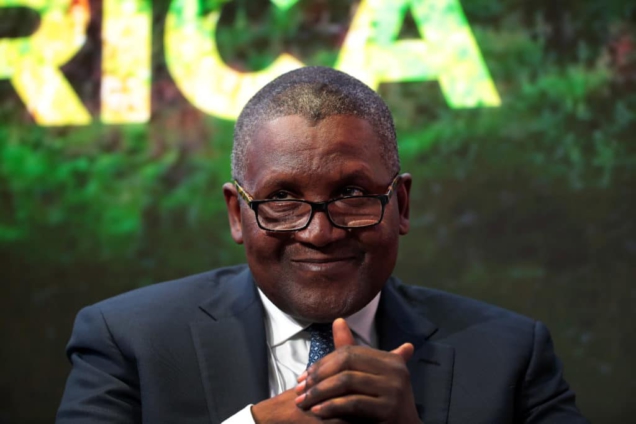Nigerian legislators on Monday began an investigation into the alleged importation of contaminated fuel into the country, part of efforts to resolve issues causing a rift between an oil refinery owned by Africa’s richest man Aliko Dangote and the industry regulator.
A legislative committee tasked with carrying out the probe is also looking into allegations of the “indiscriminate issuance of licenses and the alleged unavailability of international standard laboratories” blamed for such contaminated products, its chairman, Ikenga Ugochinyere, said in the capital of Abuja.
The committee called on parties in Nigeria’s petroleum sector to “deescalate tensions” that have been deepened in recent weeks by accusations from the regulator that Dangote was seeking a monopoly in the market and that his refinery’s products are of a low standard.
Nigeria’s junior petroleum minister Heineken Lokpobiri, meanwhile, met with Dangote and officials from the country’s petroleum sector in what he called a “collaborative effort” to address the issues facing the refinery.
“All parties involved demonstrated a strong commitment to proactive problem-solving,” the minister said after the meeting in a post on social media platform X.

The 650,000-barrels-per-day refinery in the economic hub of Lagos is the biggest in Africa and was touted by authorities as a game-changer that would end the oil-rich country’s dependence on imported petrol.
However, the $19 billion facility has been off to a slow start despite opening more than a year ago. It has had to source crude oil from other countries after failing to secure supplies in Nigeria, whose capacity as one of Africa’s biggest oil producers has been impeded by oil theft and chronic corruption.
A senior executive of the refinery has also accused international oil companies in Nigeria of plotting the refinery’s failure. “It is either they are deliberately asking for a ridiculous premium or they simply state that crude is not available,” Devakumar Edwin, a vice-president of Dangote Industries, said of the companies.
The Dangote refinery’s challenges compounded last week when the Nigerian Midstream and Downstream Petroleum Regulatory Authority said its product quality, along with those of other local refineries, was “more inferior” compared to that of imported products.
“Dangote is requesting that we should suspend or stop the importation of all petroleum products … and that is not good for the market because of monopoly,” said Farouk Ahmed, chief executive of the regulatory agency.
Dangote denied both claims and invited lawmakers to inspect the plant where its product was tested. He said he did not receive any incentive from the Nigerian government regarding the refinery. He has also said he was calling off plans to invest in Nigeria’s steel industry.
It is not clear what is the origin of the rift between Nigerian authorities and Dangote, whose companies also dominate markets such as cement and flour. The dispute began after last year’s presidential election that was won by President Bola Tinubu who replaced Muhammadu Buhari, a known ally of Dangote, who had completed his tenure as president.
Analysts say such a dispute could send the wrong signal at a time when the country is seeking to ramp up foreign investments and stabilize its ailing economy.
Such allegations about low-quality products from the refinery seem “odd” especially when presented without evidence and in the absence of complaints from consumers, Nigerian economist Bismarck Rewane said, reechoing concerns the claims are only a sign of more deep-rooted issues.
Latest Stories
-
Republic Bank Ghana to double GH₵3bn loan advances with ‘Republic Verse’ initiative
3 minutes -
NDC’s push to remove Chief Justice threatens democracy – Miracles Aboagye warns
8 minutes -
OSP appeals acquittal of Juaben MCE nominee in alleged bribe case
24 minutes -
Empowering Africa’s Digital Future: How Artificial Intelligence is driving sustainable network infrastructure
50 minutes -
Republic Bank Ghana PLC records GH₵210.67m profit in 2024
1 hour -
Influence of market queens creating food shortages and causing high food prices – Dr. Ofosu-Dorte
1 hour -
Surging travel in Europe spikes concerns over tourism’s drawbacks
1 hour -
Federal Government hands over houses to 1994 Super Eagles heroes after 31 years
1 hour -
Air India crash attributed to pilot seat malfunction
1 hour -
GCAA and South Korea sign letter of intent to advance Ghana’s drone sector
1 hour -
Republic Bank Ghana promises improved lending to customers, prospective home owners
1 hour -
Ghana ranks among top 6 African economies in Intra-African trade – Afreximbank Report
2 hours -
Allied Health Professions Council warns against unlicensed practice
2 hours -
Energy Minister engages petroleum sector stakeholders on laycan concerns
2 hours -
‘We played a great second half’ – Black Queens coach on friendly against Benin
2 hours

